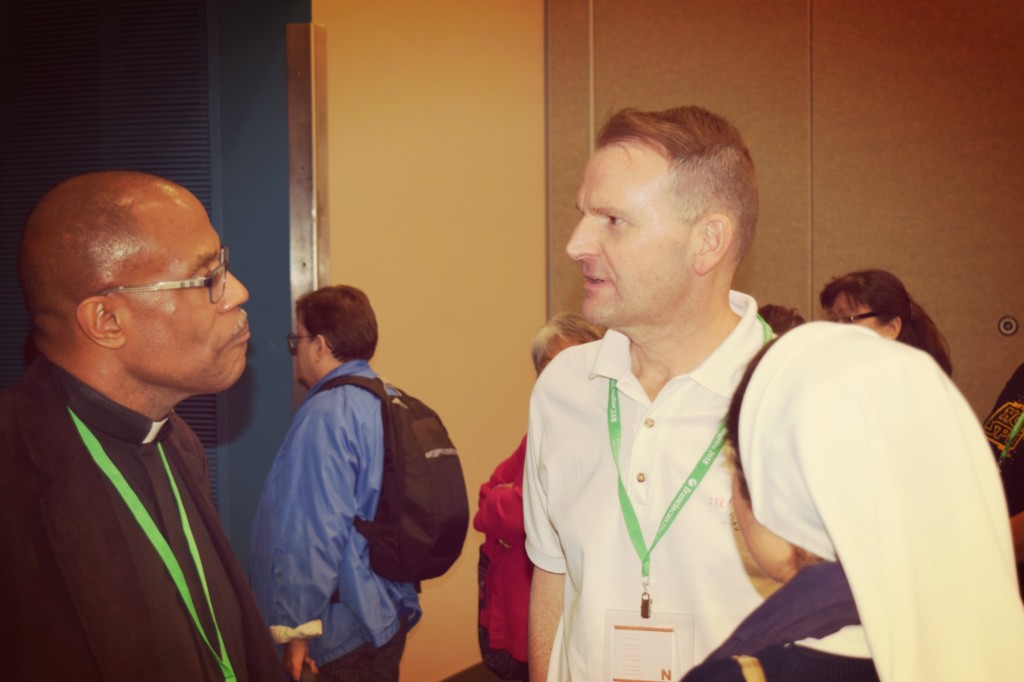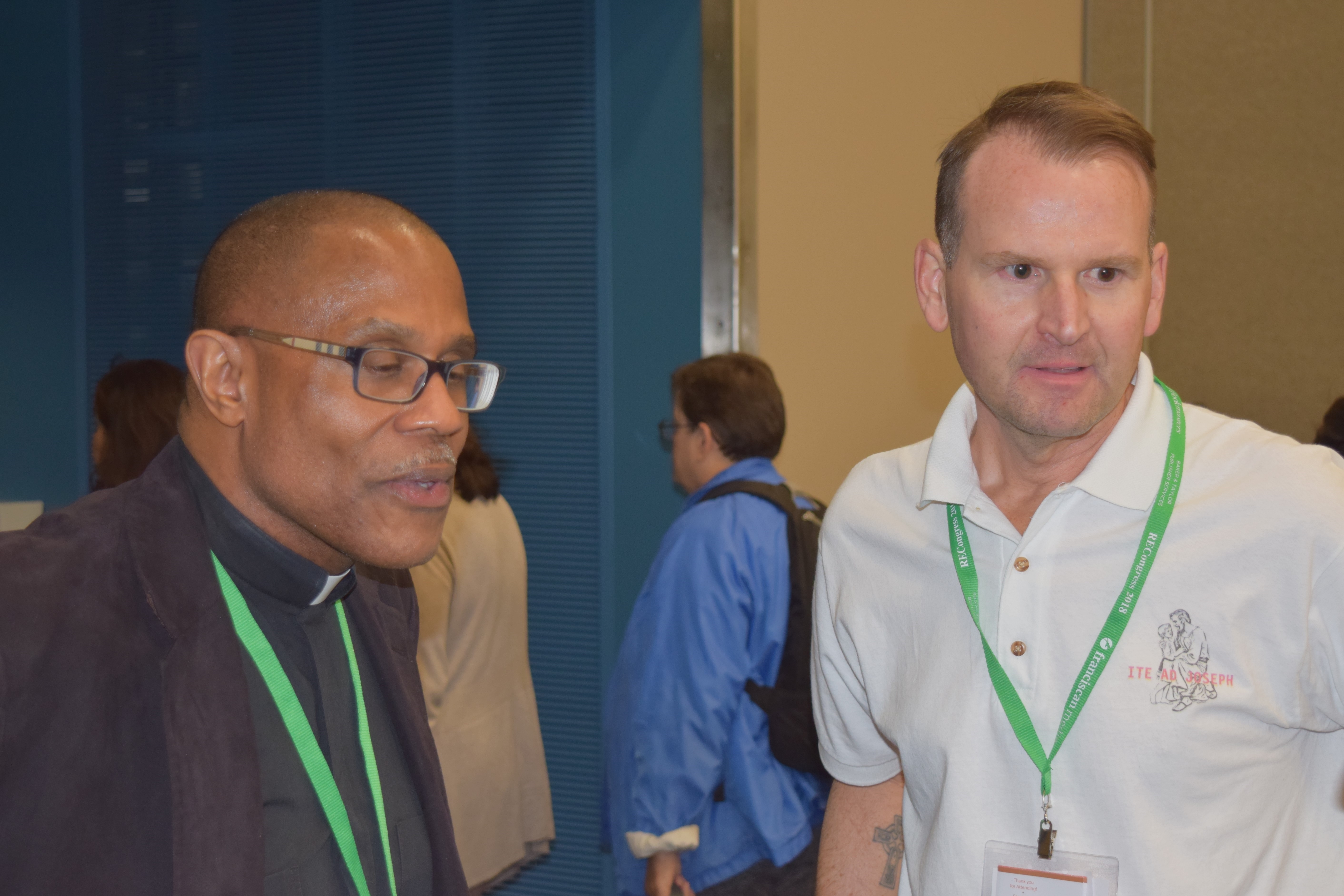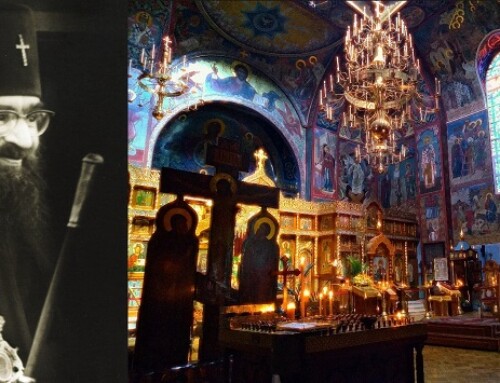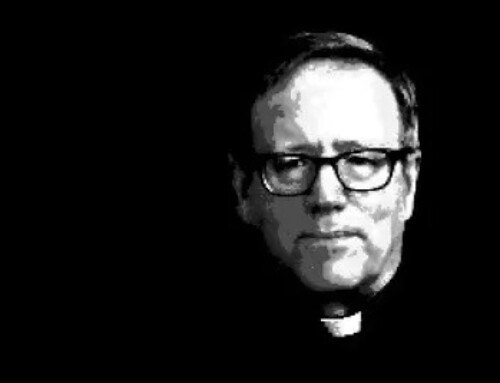
(Picture above: I attempted, along with a concerned religious sister, to have a meaningful and respectful conversation with Bryan Massingale after his talk on transgenderism at the LA Religious Education Congress; but despite my questions about his statements and the valid critiques made by the sister, Massingale remained defensive and dismissive; even though he repeatedly calls for others to do so, he does not “dialogue” with those who disagree with him.)
In an article published on April 3, 2018, entitled “The LGBT conversation is a sign of new life in the church: Is the church changing its tone regarding LGBT issues?” written by Elizabeth Lefebvre for U.S. Catholic, a number of the featured speakers who addressed the LGBT topic at the recent 2018 Los Angeles Religious Education Congress, were quoted as they shared their opinions concerning the future of LGBT ministry in the Catholic Church. U.S. Catholic is a “Catholic” social-justice focused periodical published by the Claretians; Elizabeth Lefebvre is the former editor, but still contributes articles through her blog. In 2014, she took a decidedly conciliatory stance with regards to the legalization of same-sex marriage in the US; in her discussion of how Utah Senator Orrin Hatch reacted to state-level recognition of same-sex marriage, she wrote:
While clarifying that he [Hatch] disagreed with decisions from judges in Utah, who had overturned the state’s ban on same-sex marriage, Hatch continued: “I think it’s a portent of the future that sooner or later gay marriage is probably going to be approved by the Supreme Court of the United States, certainly as the people in this country move towards it, especially young people. I don’t think that’s the right way to go; on the other hand, I do accept whatever the courts say.”
Is there a way for the Catholic Church to respond to this reality in a similar way? To basically say: We don’t think this is the right way to go, but we accept that the courts say this is legal and that this here to stay. Instead of reacting by declaring court decisions mistakes and travesties of justice—as was done after the recent decision in Pennsylvania that declared the state’s ban on same-sex marriage unconstitutional—it seems more realistic for the church as an institution to adopt the attitude that Hatch is putting forth. It’s no secret that Catholics in the pew don’t see eye to eye with church teaching on the issue: A March 2014 Pew survey shows that close to 60 percent of Catholics support same-sex marriage.
In her latest article, after citing a study which found that 70% of American Catholics think homosexuality should be accepted by society, Lefebvre wrote:
The compassion of Pope Francis mimics the pastoral tone that has infused his entire papacy, creating an environment that is more open to conversation. He uses the word gay and has offered messages of support and welcome to LGBT people. He met with a gay former student on his visit to the United States in 2015. He has called on Christians to apologize to gay people for offenses committed throughout history.
With regards to this new “environment that is more open to conversation,” Bryan Massingale said:
Pope Francis isn’t creating a revolution, but what he’s doing is creating the space in which the Spirit can speak and be heard…While there hasn’t been any official change in church doctrine, under the papacy of Pope Francis there is a greater freedom to address issues of sexual ethics and sexual morality more openly than there has been under the previous papacies
Bryan Massingale is curretly a professor of Theology at Fordham University. In 2017, Massingale spoke at New Ways Ministry’s Eight National Symposium. In 1999, the co-founders of New Ways Ministry were officially silenced by the Vatican. On March 16, 2018, Massingale was a panel presenter at the LA Religious Education Congress for a workshop entitled “Transgender in Our Schools: One Bread, One Body.” On the topic of transgenderism and the Catholic Church, Massingale stated that the Church is in “a period of discernment:”
So, what do we do when we don’t understand? It means the Catholic Church is all over the board on this. It means if you go to Holy Rosary College, and you transition as a student, they will welcome you with open arms, and the campus ministry will accept you and they will provide housing and accommodations. Or you go to Saint Kundykunda’s, try not to pick anybody…and you transition, you can be expelled. Because that’s the kind of place we are at right now because the Catholic Church is in a period of discernment as we are trying to understand what we don’t understand.
Concerning a change in Church teaching with regards to homosexual activity, in comparison to the process which took place in the Episcopal, Presbyterian, Methodist, and Lutheran churches, Massingale argued:
They all went through a messy period marked by a divergence of opinion and open disagreement on approach…We can’t expect the Catholic experience to be any different. The differences we see among official leaders are part of a normal process of coming to a different place.
He continued:
I think this is a call for us as Catholics to accept the reality that we live in a church that’s in the midst of hesitant but real change and development. How do we help our people to understand that this isn’t something that’s entirely new in church history?
Lastly, according to Lefebvre:
Father Massingale believes that while it may not be an easy journey, eventually the Catholic Church will celebrate the committed expressions of love between LGBT persons. “I don’t think that our commitment to the equal sacred personhood of every human being gives us any other choice,” he says. “The metaphor I use to say where we are as a church is that we are in an early spring. Especially in the Midwest, in early spring the fields are muddy and you can have blinding snow storms and frigid arctic blasts even as the season changes. We’re in this transitional time when we’re moving out of one paradigm of understanding human sexuality and into another. That’s part of the mess we’re in, but it is our faith as Catholics that this mess contains the ground for new life and new birth.”
Also quoted in the article were Arthur Fitzmaurice and Yunuen Trujillo both of whom spoke about the LGBT issue at the 2018 LA Religious Education Congress. Fitzmaurice said this about Catholic Bishops and the acceptance of homosexuality:
While the influence of the bishops has helped create safe spaces and the ability for dialogue where there wasn’t 5 to 10 years ago, the institutional church does not seem to be on pace with what’s happening in society.
Fitzmaurice added:
I think it would be huge if the church said, ‘We acknowledge that there is love between many people in the church, not just heterosexually married people, that is reflective of the kind of love that Jesus proclaims.
Arthur Fitzmaurice is openly gay and currently (since 2010) serves as Resource Director for the dissident Catholic Association of Lesbian and Gay Ministries (CALGM.) Concerning the Catechism and the statement that homosexual acts are “intrinsically disordered,” Fitzmaurice wrote: “The language certainly still needs to change. It is gravely evil language.” In 2012, board members of CALGM, including Fitzmaurice, refused to sign an “oath of personal integrity” to Catholic teaching. In 2016, Fitzmaurice signed an on-line petition created by “Call To Action” which asks for changes in The Catechism regarding teachings on homosexuality.
According to Lefebvre, Yunuen Trujillo is precipitating a wider change within the Church, starting at the parish level:
…meaningful change is more often than not coming from laypeople. “It’s happening from the bottom up,” she says. “My parish started an LGBT ministry, and the community has been asking questions. Some people are not happy with it and some are, but just the fact that they’re starting to ask questions is a good thing, since that’s how we start the dialogue.”
As stated on her Twitter and Facebook accounts, Yunuen Trujillo is a “Regional Coordinator with the Archdiocesan Young Adult Ministry.” She is also a “Catholic” radio host with PJLA-Radio TV, and is active with the Los Angeles Archdiocese Catholic Ministry with Lesbian and Persons (CMLGP).
In her video for The Ministry with Lesbian & Gay Catholics, Trujillo stated:
“…Not all stories are the same. You are going to hear stories about people who have chosen to remain chaste, you will find stories of people who have partners, and you WILL find that they can be equally holy and it is going to be absolutely mind-blowing, and you’re not going to understand why at the beginning. But you are going to be able to see stuff that you may not be able to see right now, when you get to actually listen to stories.”
If you have questions or concerns about those speakers who will be invited to return for the 2019 LA Religious Education Congress, please contact:
Archdiocese of Los Angeles
3424 Wilshire Blvd.
Los Angeles, CA 90010-2241
phone: (213) 637-7000
email: info@la-archdiocese.org






I applaud you, Joseph, for venturing into that den in L.A. .
I would not return to that annual event. You have been a faithful witness to the Truth. You have followed the command of our Savior.
Do not cast your pearls before swine.